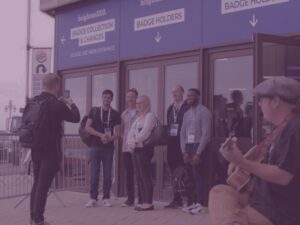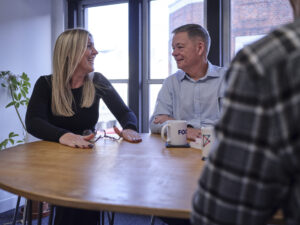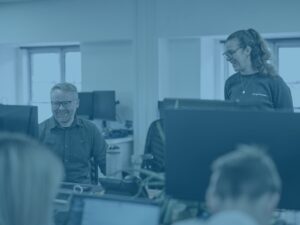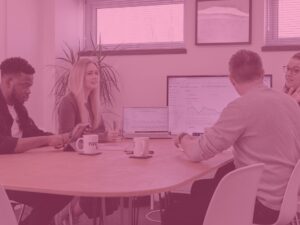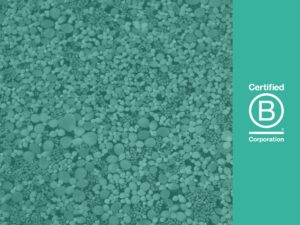Sustainable Growth and Smarter Partnerships: Insights from Our Online Panel
At Footprint Digital, we believe that business growth should mean progress with purpose.
That belief inspired our recent online panel discussion, Sustainable Growth and Smarter Partnerships, which explored what it truly means to run a responsible business in today’s complex world.
Hosted by our marketing manager, Alex, the session brought together four inspiring B Corp agency leaders: Sally Pritchett, CEO at Something Big, author of Overloaded, and expert in intentional communication; Simon Croft, founder of strategic design agency Orangery; Louise Palmer, joint managing director at Wildfire PR and an advocate for equality; and Footprint Digital’s own partnership manager, Jon Maddams.
Together, they shared their experiences of embedding sustainability, authenticity and values at the heart of business growth.
Rethinking What Growth Means
The conversation began with a question: what does responsible growth look like?
Jon suggested that growth should not simply mean expansion, but finding better, smarter ways of doing things. He encouraged businesses to view sustainability as a driver of innovation, focusing on long-term roadmaps, investment in people and technology, and measurement of environmental and social outcomes alongside financial results.
Jon explained that truly responsible growth looks beyond quarterly targets and short-term wins. It is about building a legacy that benefits future generations; creating businesses that last because they operate ethically, sustainably and intelligently.
Sally and Simon took this further, discussing the importance of eliminating waste in all its forms.
Sally observed that “wastage is wastage”, whether it is physical waste or wasted communication, and that true sustainability is about performance, not idealism.
Simon added that modern growth is not about more output, but about smarter solutions that simplify, streamline and add value.
Both agreed that doing less, but better, often leads to greater impact.
Values and Purpose as a Talent Magnet
Louise noted a growing trend among younger professionals who expect companies to stand for more than profit.
She explained that job candidates now ask about community initiatives, internal progression and ethical practices. Both Louise and Sally said that becoming B Corp certified has helped their agencies attract the right people, since the accreditation signals a commitment to fairness and responsibility.
Jon pointed out that employees who feel connected to their company’s mission quickly become advocates for it. When people believe in what they are doing, integrity and accountability follow naturally.
Alex and Simon also pointed out that the benefits of retaining engaged employees extend far beyond culture. Long-term team members preserve institutional knowledge, improve consistency, and streamline delivery for clients. This stability saves businesses time and resources, allowing teams to focus more on innovation and continuous improvement.
They summarised this as the competitive advantage of “stickier people”; those who stay longer, carry valuable knowledge, and strengthen client relationships through continuity and trust.
Trust and Transparency in an Uncertain World
Sally described the current business climate as “BANI”: brittle, anxious, nonlinear and incomprehensible.
In this environment, she argued, trust becomes the anchor that keeps relationships steady.
She encouraged collaboration with suppliers and partners rather than treating them as transactional vendors.
Louise added that being honest about where a business currently stands, and clear about its future goals, builds credibility even when the journey is imperfect.
Jon highlighted that inauthenticity and inaction are some of the greatest risks facing organisations today. People can spot “greenwashing” or empty gestures, and businesses that fail to live their values risk losing relevance.
Simon agreed, noting that responsibility should be baked into the business model itself rather than treated as a marketing exercise.
The panel also discussed the need for bravery in communication. Silence, they agreed, can sometimes send the wrong message and be just as damaging as dishonesty. Even when the path isn’t perfect, businesses should be transparent about their position and progress. This kind of honesty builds credibility and invites meaningful collaboration.
In today’s environment, brave and intentional communication is not optional; it is essential.
How to Communicate Authentically
Louise advised businesses to identify their unique message and own it, instead of mimicking competitors or chasing controversy.
Simon and Sally recommended that companies stress-test their values by running strategy sessions and exploring hypothetical scenarios that challenge their principles. This process helps create a clear and consistent narrative for decision-making. Sally added that testing values through growth decisions, for example, deciding whether to turn down an opportunity that conflicts with company ethics, is a useful way to ensure they are genuinely lived.
Values and Chemistry in Partnerships
Partnerships built on shared values, the panel agreed, are far more likely to succeed.
Simon explained that values-led organisations stand out through their strategic knowledge, motivated teams and collaborative mindset, which help de-risk projects and foster long-term relationships.
He suggested looking for evidence of authenticity, such as transparent reporting, aligned client portfolios and recognised accreditations like B Corp certification.
Louise added that being a responsible business also means having solid foundations – things like progressive maternity/paternity policies, robust data protection and cybersecurity testing.
These operational standards make it easier for clients to engage with confidence.
Sally reflected on her 25-year relationship with a founding client as proof that chemistry and alignment can sustain meaningful partnerships over decades.
She added that the courage to decline opportunities that do not align with a company’s principles is a hallmark of a mature, values-led business. Saying no, she said, is sometimes the most powerful demonstration of integrity a brand can make.
Jon agreed, observing that values-driven agencies tend to be more reflective and more willing to challenge or say no to clients when necessary, which builds mutual respect and better outcomes.
Measuring Real Impact
The final discussion point turned to sustainability initiatives and how to ensure they create genuine change.
Louise cautioned against undertaking projects purely for publicity, describing this as “bad PR”.
Sustainability should be embedded in a company’s identity, not bolted on for effect.
Sally added that brands that treat social or environmental responsibility as temporary trends often suffer reputational damage, particularly among younger audiences who expect authenticity and are willing to walk away when it is absent.
Sally highlighted the ongoing challenge of diversity and inclusion reporting, particularly around the widening gender pay gap. She encouraged leaders to be open about these challenges and to focus on systemic change, reinforcing that progress in this area is a vital part of sustainable business growth.
Jon encouraged a focus on measurable data and progress rather than perfection. Transparency, he said, builds far more trust than polished PR. Sally agreed, citing diversity and inclusion reporting as an area where honesty about challenges and steps for improvement is far more meaningful than avoiding uncomfortable truths.
Alex closed the session by reminding attendees that clients and consumers are intelligent and perceptive; authenticity and transparency are not risks to be avoided but strengths to be embraced.
Looking Ahead
The panel left us with a clear message: sustainable growth is not about slowing down; it is about becoming smarter, clearer and more intentional.
Businesses that embed responsibility into their strategy, communicate openly and form partnerships based on shared values are the ones best equipped to thrive in a changing world.
At Footprint Digital, we are proud to host conversations like these that move our industry forward and to work with partners who share our commitment to making a positive impact.
To stay updated on future panels, events and insights around sustainability and ethical business, follow us on LinkedIn or visit our website’s events page.
